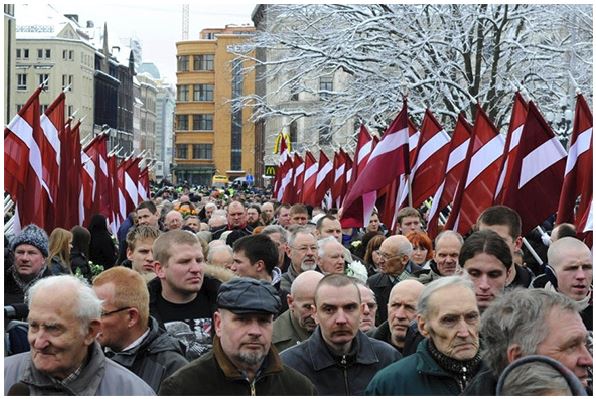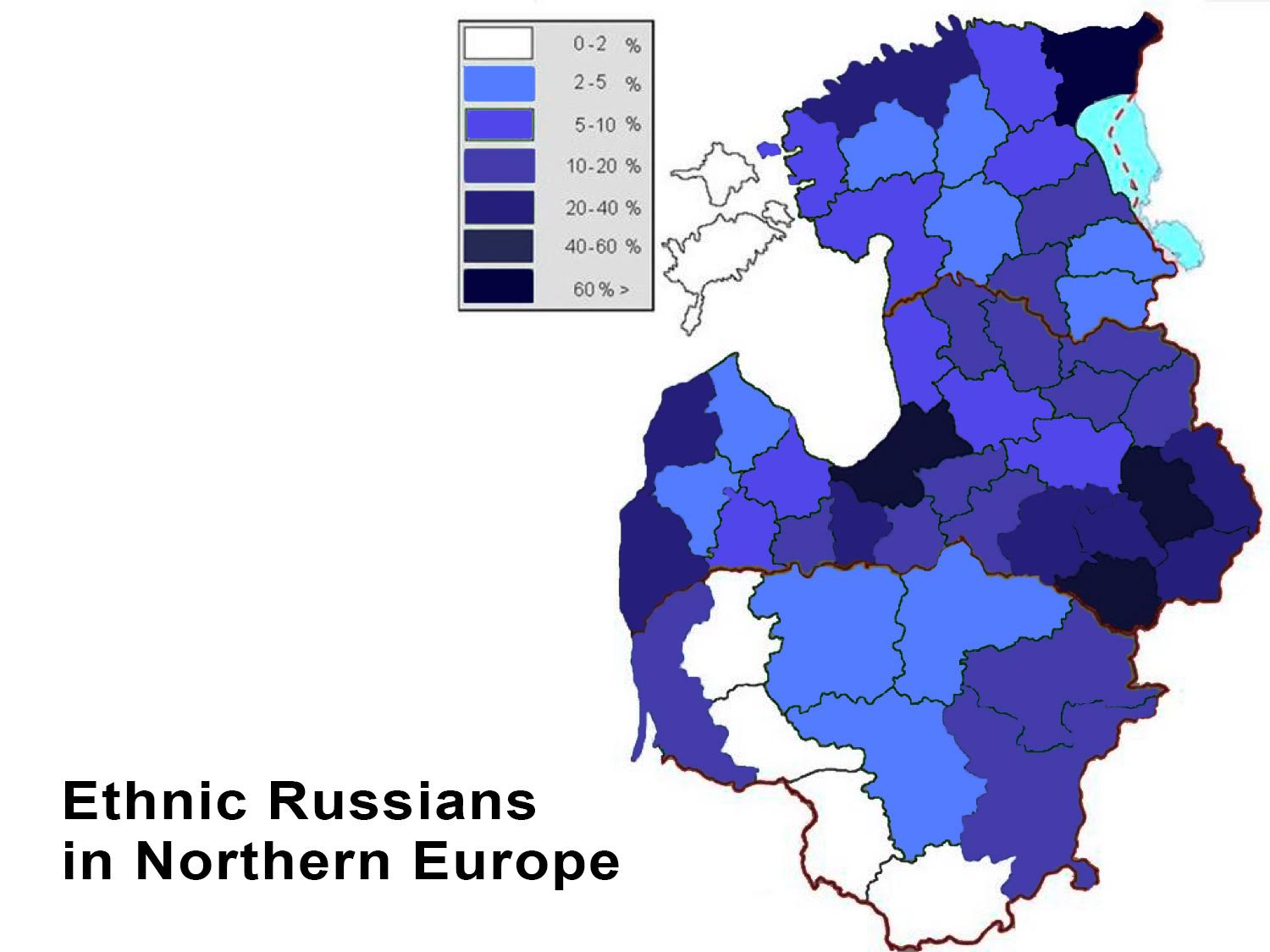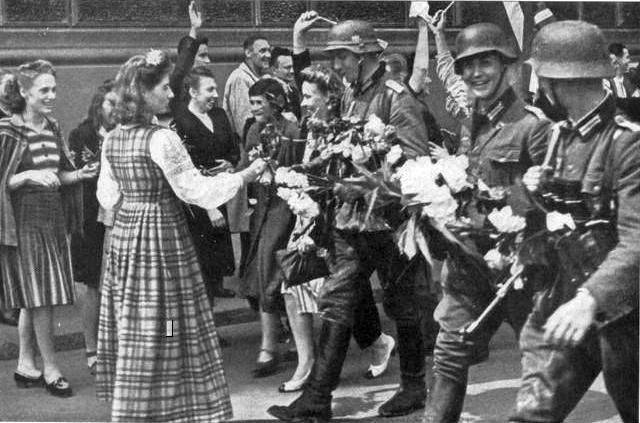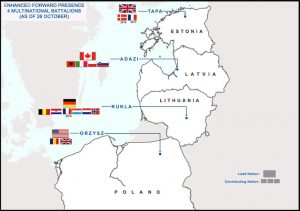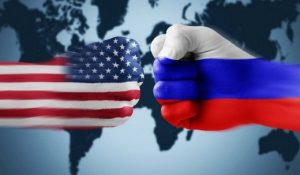
Views: 636
The logical question is whether Putin’s military action of pacification of NATO extremists and denazification of Eastern Europe will stop in Ukraine (called by some commentators on social networks Nazikraine) or will the action continue in the direction of the west, i.e., to Central Europe and/or the Baltic States?
Of course, at this moment, it is difficult to predict what the development of events will be in the next period, especially when this current operation in Ukraine is not completely finished. However, one thing is certain: analogous to the case of Ukraine, it can be predicted that Russia’s next step depends exclusively on the policy of the NATO pact, i.e., the American puppets in Central Europe and the Baltics. In other words, nothing will happen if Russia is not directly and extremely rudely provoked by NATO members and thus has to react preventively, as in the case of Ukraine.
If we look the truth in the eye, the current military conflict in Ukraine may be essentially just the beginning of Russia’s final struggle against NATO Russophobic policy that zealously follows the line of the notorious Russophobe, Polish emigrant Zbigniew Brzezinski (1928−2017), a former US National Security Adviser. Therefore, the next in line for pacification on Putin’s list could easily be the three Baltic states – Estonia, Latvia, and Lithuania, which joined the NATO pact in April 2004, and since then they have been in the forefront of barking at Russia, especially Lithuania. The problem is that the Baltics have been constantly militarized by the NATO pact for the last 18 years officially in order to defend three Baltic States against alleged Russian military aggression. A few years ago, Lithuania reintroduced compulsory military service for men (9 months) and is preparing to do the same for women soon. Absolutely all Russian information media in all languages and all forms are currently blocked in the Baltics, so information can only be obtained from uncensored (pro-NATO and pro-EU) information sources.
All NATO military potential invested in the Baltic States is not only defensive but also offensive, and the Baltic region from this perspective is no different from the case of Ukraine after the 2014 Maidan Coup followed by violent changes of government. By the way, Lithuania, for example, does not hide the fact that it sells and delivers (NATO) weapons to Ukraine long before the start of Putin’s special operation on February 24th, 2022. By that time, Ukraine was already full of NATO weapons, training specialists, volunteers, etc., so that, in fact, Ukraine is not fighting against the Russian “invasion”, but Russia is fighting a complete NATO pact that provoked and financed this military conflict on the territory of Ukraine. It is possible that from the same geopolitical, military-strategic, and economic goals, NATO will do the same with the Baltics as it did with Ukraine, that is in other words to push the three Baltic States into a military conflict with Russia.
For Russia, by the way, it is completely irrelevant where NATO missiles with nuclear warheads are located: whether in the vicinity of Kharkiv or Tallinn. The same goes for NATO troops, aviation, and tank divisions that still fill the Baltics. Let us remind ourselves that, for example, St. Petersburg (the second-largest city in Russia) is the first neighbor of Estonia and Tallinn. These two cities are 318 km of air distance and by car can be reached in 4.25 hours (370 km). However, a ballistic missile with a nuclear warhead arrives from Tallinn to St. Petersburg in a few minutes.
Unfortunately, the Baltic States are taking fast steps along the path of Ukraine, to which Washington has assigned the role of a holy sacrifice offered on the altar of the Western crusade against Russia and the Russian people for the continuation of global American domination and destruction of Russia as a state. Of course, after Russia, it would be China’s turn. All those who want to live in Russia and live near Russia should understand one very simple thing. Russia, which was pushed to a dead-end by the Ukrainian policy of the NATO pact, now has only one solution left, that is, the only way to survive, and that is the final victory, primarily on the battlefield. The victory should, of course, be as fast and painless as possible, and thus maximally effective, taking into account the bare fact that in Ukraine Russia is, actually, fighting against the NATO pact and the EU, which turned Ukraine into a scapegoat. Eight years ago, after the Maidan coup in 2014, Ukraine became occupied by the NATO pact that built secret military bases on its territory, of course preparing for the war against Russia, which only needed to be provoked and thus forced to formally be the first to pull the trigger. At the beginning of 2022, Russia estimated that the NATO pact would need only ten more years of “negotiations in the Normandy format” for military aggression against Russia to become a reality. In this situation, a preventive war is simply inevitable.
Today, the official “international” conjuncture that is in Western hands in every possible way – from the need for energy in the global economy recovering from the global “pandemic” to the domestic political situation in the United States – is doing everything in its power to prevent Russia from constructively participates in the so-called “reset” including global politics and international relations. What all of Russia’s enemies need to understand is that a reborn Russia will not allow more war to be waged on its state territory than it was last time during World War II. In other words, Stalin’s mistake and credulity of 1941 will not happen again.
So, in the above context, after the current NATO war in Ukraine against Russia, the next round of negotiations between Russia and the United States on strategic security of both Europe and Russia will be negotiations on NATO’s presence in the Baltics. However, if these negotiations take place in the same way as before regarding Ukraine, then the Baltics will face the fate of Ukraine. Unfortunately, first of all, residents of Estonia, Latvia, and Lithuania, as things stand now, there is a great chance that this is exactly what will happen because it is just as useful for the Pentagon to sacrifice these three countries following the designs for Ukraine to bog Russian military as deeper as in the fields of Ukraine for as long as possible time. Anyway, and the most important, American blood is not shed under the 1969 Nixon (or Guam) doctrine on ways to fight the USSR and the Warsaw Pact (but instead, financing, arming, and pushing others to fight for the American national interests).
It should be reminded that the northwest of Russia has been one of the epicenters of military and political escalation in Europe for several years now, especially the Kaliningrad region, which is the most vulnerable part of Russia in geostrategic terms, considering that it is physically isolated from the mainland, in other words, cut off from the main part of Russia and surrounded at the same time on all land sides by enemy NATO countries. NATO pact has already started putting pressure on this Achilles’ heel of Russia, so it can be expected that the Kaliningrad Region could soon find itself in a complete NATO blockade, which would certainly lead to new war escalations with Russia. In a way, the residents of Kaliningrad are already preparing for such a scenario.
It is encouraging that the Russian authorities have known all these years who controls Poland and the Baltic countries, especially Lithuania, who is their boss and commander, and what their plans are against Russia. That is why power plants were built in the Kaliningrad Region, money was invested in agricultural production, “Iskander” defense complexes, and an LNG terminal for natural gas were brought. The strategic autonomy and security of any region in Russia is guaranteed by Moscow in a way that we can talk about preserving the living standards of the people, and not about their protection from hunger and bombing.
One thing can be said about the people of the Baltic States. Now their Western bosses are sending them exactly on the Ukrainian road against Russia. For their “defenders of Russian aggression”, it is most useful to push them to the end and thus reach the point where the Banderist Ukraine is now. However, in the Baltic States, the truth about Russia is forbidden because the channels that talk about it were not only occasionally censored, but already permanently banned. The signing of petitions by employees on loyalty to the “anti-Putin’s” policy of the West is currently required, as is the case with the European Humanities University in Vilnius (sponsored by the EU and Western NGOs), which launched the signing of such a petition on March 3rd, 2022 (link to the petition is sent to the e-mail addresses of employees). Of course, employees who do not sign the petition can say goodbye to the job at the university (the petition is signed under the full name and surname).
Baltic Estonians, Latvians, and Lithuanians still live in the unsustainable illusion that NATO will fight for them and that only additional NATO forces and weapons can save them from alleged Russian aggression. However, NATO will certainly not fight for them (at least not in the direct sense), even though they are NATO member states. It will be the same in the Baltics as now no one NATO member state is fighting for the Banderist Ukraine (except paid dogs of war). In the event of war with Russia in the Baltics, the West will use the local population as clay pigeons and cannon fodder – it will fight like the Englishmen against the Germans to the last Frenchman.
Today, Russia has been brought into a situation by the West that it has to make unconventional, radical, and hitherto unimaginable decisions in foreign policy and international relations. Otherwise, it would be destroyed in a short time. In short, Russia, from a patient country with a lenient and extremely flexible policy in international relations since the end of the Cold War, has been forced to finally show its teeth in order to survive Western Russophobic imperialism. Whether the Baltics will feel those teeth after the Banderist Ukraine depends only on the decisions of Western bosses of the Baltic States. A recent official announcement by Moscow is being sent to the Baltics that is the warning of the Russian Foreign Ministry that extremely rising of Russophobic propaganda in Estonia, Latvia, and Lithuania, as well as physical attacks on Russian diplomats and embassy buildings (in Vilnius and the Belarusian embassy building too), could lead to unforeseeable consequences in this European region.
Dr. Vladislav B. Sotirović
Vilnius, Lithuania
Fellow to Center for Geostrategic Studies
Belgrade, Serbia
vsotirovic@yahoo.com
© Vladislav B. Sotirović 2022
Personal disclaimer: The author writes for this publication in a private capacity which is unrepresentative of anyone or any organization except for his own personal views. Nothing written by the author should ever be conflated with the editorial views or official positions of any other media outlet or institution.
FOLLOW US ON OUR SOCIAL PLATFORMS

